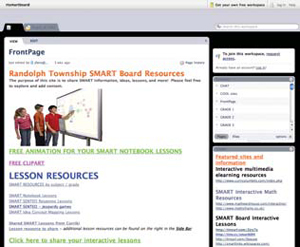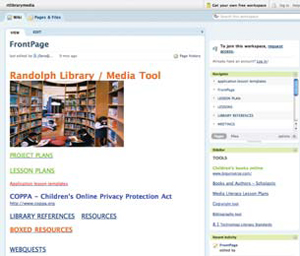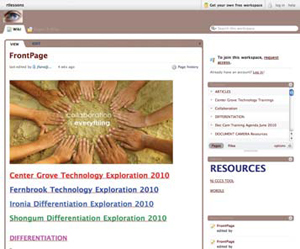How It’s Done: Working Wikis

Tools and ideas to transform education. Sign up below.
You are now subscribed
Your newsletter sign-up was successful
By Ellen Ullman
In summer 2007, Randolph (NJ) Township Schools created a wiki on which administrators and supervisors could discuss Grant Wiggins’s Understanding by Design. “At first people rolled their eyes, but once they saw that it was a Web page to interact with, they liked it,” says Jennifer Fano, an administrator.
Fano began doing teacher workshops that led to the creation of more wikis. Students saw them and started their own wikis to use as study guides, posting questions about what they wanted to learn.
Randolph says, “With a wiki, we can be the expert or invite an expert to comment. Everyone can put in their two cents, and in real time.”
Debbie Iosso, principal of Randolph High School, uses a wiki to communicate with her 75-person staff. “It’s nice to have a collaborative environment where we can share information and everyone can see each other’s comments,” she says. Her wiki has staff agendas and resources, including links to articles on differentiated instruction, which has been a district-wide focus. When Iosso invited an expert on differentiated instruction to look at the wiki, the expert added her own comments.
Across the district, wikis have sprouted up everywhere. Middle and high school teachers use them for group projects. A math teacher who solves problems with the screencapturing tool Jing (jingproject.com) embeds his work into his wiki for continuous review. Third-, fourth-, and fifth-grade teachers use wikis to create centers that include directions for assignments and student work.


Whenever there’s a committee meeting or a professionaldevelopment workshop, an accompanying wiki has related lessons or other relevant pieces.
Tools and ideas to transform education. Sign up below.
The district has even started a wiki for parents. “Often parents leave a meeting and feel like they have nothing to go home with,” says Iosso. Now they can log on to a wiki that contains resources such as helpful articles.
Fano credits wikis with helping get students more engaged. For Iosso, two more benefits of wikis are their historical value and the fact that she can use them to keep attachments and other materials her teachers need. “People sometimes feel more comfortable typing how they really feel on a wiki rather than stating it at a faculty meeting—which can be good or bad!”
What They Use
• PBworks, pbworks.com
• Wikispaces, wikispaces.com
• Wetpaint, wetpaint.com
Randolph Blogs
• District lesson share:
rtlessons.pbworks.com/FrontPage
• District professional development:
rtsmartboard.pbworks.com
• Biology wiki:
eberbio.pbworks.com
• Literacy wiki:
literacyshare.pbworks.com
• Library media-specialist space:
rtlibrarymedia.pbworks.com
• The Wiggins wiki:
understanding bydesign.pbworks.com/FrontPage
